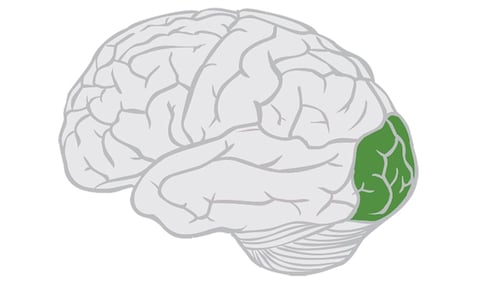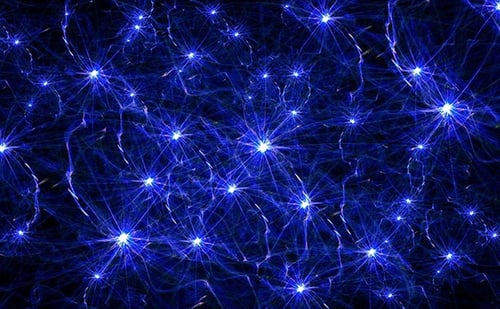Occipital Lobe: Function, Location and Structure
The Occipital Lobe helps with visual processing and mapping. It is located under the parietal lobe and above the temporal lobe near the back of the brain.

The Occipital Lobe helps with visual processing and mapping. It is located under the parietal lobe and above the temporal lobe near the back of the brain.
The occipital lobe is the seat of most of the brain's visual cortex, allowing you not only to see and process stimuli from the external world, but also to assign meaning to and remember visual perceptions. Located just under the parietal lobe and above the temporal lobe, the occipital lobe is the brain's smallest lobe, but its functions are indispensable.

Understanding the occipital lobe requires a basic understanding of brain anatomy. The cerebral cortex of the brain—a part of the brain shared by all vertebrates—is the newest part of the brain, evolutionarily speaking. All mammalian brains have four distinct lobes, but the brain itself—as well as the lobes it contains—is divided into right and left hemispheres. This means that each lobe can actually be divided into two parts. The occipital lobe includes a right and left lobe that interact with one another, each controlling a range of visual functions.
Like other lobes of the brain, the occipital lobe does not have clear internal boundaries separating it from the rest of the brain. Instead, neuroscientists use the skull's bones as their guide, so the occipital lobe rests underneath the occipital bone.
The occipital lobe is the rearmost lobe of the brain, located in the forebrain. It rests upon the tentorium cerebelli, a thick membrane of tissue the separates the cerebrum from the evolutionarily older cerebellum.
Studying the brain is a difficult task, particularly since some areas compensate for others when the brain suffers damage. The brain's sensitive, dense, and complex nature means that researchers are constantly uncovering new structures within the brain, and new functions for each brain lobe. The occipital lobe is no exception to this rule.
Researchers once thought that the occipital lobe only controlled visual functions. But in recent years, they discovered that some portions of this lobe receive inputs from other brain regions. Specifically, a brain region called the dorsomedial stream receives input both from regions of the brain related to vision, and to areas that are not linked to visual processing. This suggests either that the occipital lobe may perform additional functions, or that researchers have not identified all regions of the brain associated with visual processing.
Although we know that the occipital lobe is dedicated to vision, this process is highly complex, and includes a number of separate functions. Those include:
Like all other lobes of the brain, the occipital lobe contains a number of structures and neuronal tracts that work together to enable vision. Those include:
Brain imaging studies have revealed that neurons on the back of the gray matter of the occipital lobe create an ongoing visual map of data taken in by the retinas.

No part of the brain is a standalone organ that can function without information from other parts of the body. The occipital lobe is no exception. Although its primary role is to control vision, damage to other brain regions and body parts can inhibit vision. Moreover, some evidence suggests that, when the occipital lobe is damaged, nearby brain regions may be able to compensate for some of its functions. The occipital lobe is heavily dependent on:
The most obvious effect of damage to the occipital lobe is blindness, but occipital lobe damage can have other surprising effects:
Spinal cord injuries are traumatic for patients and their families. They cause disruptive changes to every aspect of your life and there is a lot of new information to navigate and understand. Our experts have collected everything in one place to help you learn more about your injury, locate doctors and treatment centers, find financial support, and get assistance navigating your next move.
Sponsored by Tampa personal injury lawyers at Swope, Rodante P.A. a Florida law firm located at 1234 E 5th Ave, Tampa, FL 33605.
The information provided by SpinalCord.com is not a substitute for professional medical advice, diagnosis, or treatment, see Disclaimer Policy.